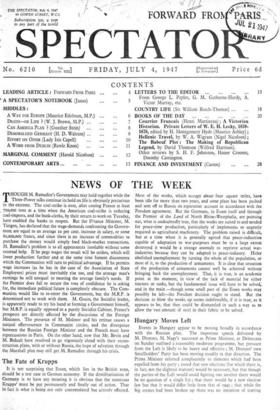The Fate of Krupps
It is not surprising that Essen, which lies in the British zone, should be a test case in German economy. If the demilitarisation of Germany is to have any meaning it is obvious that the notorious Krupps' must be put permanently and finally out of action. That in fact is what is being not only contemolated but actively effected.
Most of the works, which occupy about four square miles, have been idle for more than two years, and some plant has been packed and sent off to Russia on reparation account in accordance with the Potsdam agreement. But the Germans, in Essen itself and through the Premier of the Land of North Rhine-Westphalia, are pointing out, what is undoubtedly true, that the works are suited to and needed for peace-time production, particularly of implements so urgently required as agricultural machinery. The problem raised is difficult, but at a time when it is generally agreed that peace-industries capable of adaptation to war-purposes must be to a large extent destroyed it would be a strange anomaly to reprieve actual war- industries because they can be adapted to peace-industry. Hitler abolished unemployment by turning the whole of the population, or most of it, to the production of armaments. It is clear that cessation of the production of armaments cannot well be achieved without bringing back the unemployment. That, it is true, is an academic point at the moment, in view of the lack of material for either tractors or tanks, but the fundamental issue will have to be solved, and in the main —though some small part of the Essen works may possibly be left—the Potsdam decision ought to stand. But the decision to blow the works up seems indefensible, if it is true, as it appears to be, that they could be dismantled in such a way as to allow the vast amount of steel in their fabric to be salved.






































 Previous page
Previous page